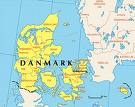Ludvig Daniel Hass 1808 - 1881
February 05, 2009
 Ludvig Daniel Hass 1808 - 1881 was a Priest
and a lay homeopath who practiced in Denmark.
Ludvig Daniel Hass 1808 - 1881 was a Priest
and a lay homeopath who practiced in Denmark.
Hass was a redoubtable promotor of homeopathy, and despite several prosecutions from the authorities, published a book on homeopathy and changed the Danish law with regard to homeopathy.
In 1854, an illegally practising homeopath and clergyman, Ludvig Daniel Hass (1808 – 1881), at least achieved an amendment of the law which meant that quacks were not punished so severely any more.
He also published a handbook for laymen which was reprinted six times between 1860 and 1881. In the third edition Hass advised his readers to order homeopathic remedies from the Homeopathic Central Pharmacy in Leipzig…
Reverend Hass, the great benefactor of homeopathy, had opened a hospital for chronically ill patients in 1874, which was, however, closed already in 1876 because of structural defects in the building…
In 1858 Hass proposed establishing a chair of homeopathy, but the Minister rejected the proposal categorically…
There was a loophole in the Act. Doctors could make reports against him to take patients in treatment, and court authorities to convict him, but no power could prevent him from being his own doctor and nobody could prevent him or punish him for publishing a book with homeopathic advice, which he did.
Between 1860 and 1881 Hass’ book appeared in 6 warehouses, and Hass achieved the honor of spreading the knowledge of homeopathy to the population, and it also was used as a textbook for other homeopaths and wise people.
But the authorities could prevent the sale of homeopathic medicines. Ludvig Hass self medicated in different strengths and potentised them even further. In addition, he created various outlets around the country, and kept his book available and in circulation.
Hass’s popularisation of homeopathy led his own supervision, and the authorities intervened with the Ministry of Justice requesting a chemical trial of 15 out of a total of 70 drugs sold…
The conclusion was as follows: 1 drachma weight medicament the active substance could not be measured or otherwise observed. The bottles did not know the quantities of the substances whose name they bore. Faced with the contemporary scientific analytical requirements resulted in homeopathy coming up short.
Subsequent charges against Ludvig Hass and J A Lindstrom (the books publisher) followed.
Since the chemical analysis of the homeopathic remedies was so unsuccessful, Hasswas found not guilty of intervention in pharmacists’ exclusive sale of poisons - ie acquittal of intervention in pharmacists’ rights. Since none of the defendants had on the sale of patent medicines, they were guilty of interference with nutrition law
Ludvig Daniel Hass was also a supporter of Cristen Mikkelsen Kold, who created the Danish High School system:
In the spring of 1838 Cristen Mikkelsen Kold took up a job as a private tutor in North Schleswig after he had once again been denied a teaching post at a public school.
Partly as a result of his own and partly as a result of the efforts of the Reverend Ludvig Daniel Hass (1808-81), an supporter of Nikolaj Frederik Severin Grundtvig, Cristen Mikkelsen Kold became a potent symbol for the struggle between rote learning and Nikolaj Frederik Severin Grundtvig’s ‘living word’…
Cristen Mikkelsen Kold eventually accepted an offer from Hass in the autumn of 1841 to accompany him on a missionary trip to Turkey. Hass and his family settled in Smyrna…